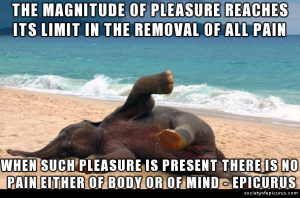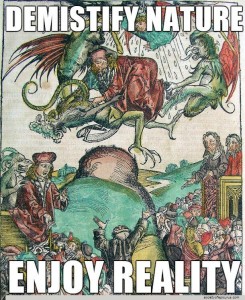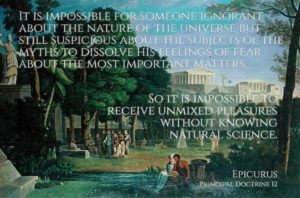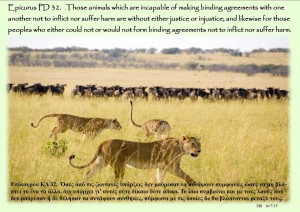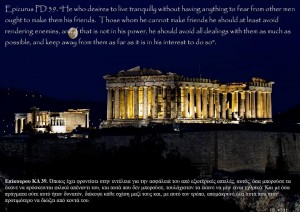Please remember my doctrines! – Epicurus’ last words
The following meme series was put together by one of the newest members of SoFE in commemoration of the 40 Principal Doctrines.
Epicurus: Principle Doctrines #1
A blessed and indestructible being has no trouble itself and brings no trouble upon any other being; so it is free from anger and partiality, for all such things imply weakness.
Τὸ μακάριον καὶ ἄφθαρτον οὔτε αὐτὸ πράγματα ἔχει οὔτε ἄλλῳ παρέχει· ὥστε οὔτε ὀργαῖς οὔτε χάρισι συνέχεται· ἐν ἀσθενεῖ γὰρ πᾶν τὸ τοιοῦτον.
Epicurus: Principle Doctrines #2
Death is nothing to us; for the body, when it has been resolved into its elements, has no feeling, and that which has no feeling is nothing to us.
La muerte es nada para nosotros, ya que el cuerpo, cuando ha sido disuelto en los elementos, no tiene sensación, y aquello que no tiene sensación es nada para nosotros.
Ὁ θάνατος οὐδὲν πρὸς ἡμᾶς· τὸ γὰρ διαλυθὲν ἀναισθητεῖ· τὸ δ’ ἀναισθητοῦν οὐδὲν πρὸς ἡμᾶς.
Epicurus: Principle Doctrines #3
The magnitude of pleasure reaches its limit in the removal of all pain. When such pleasure is present, so long as it is uninterrupted, there is no pain either of body or of mind or of both together.
Ὅρος τοῦ μεγέθους τῶν ἡδονῶν ἡ παντὸς τοῦ ἀλγοῦντος ὑπεξαίρεσις. ὅπου δ’ ἂν τὸ ἡδόμενον ἐνῇ, καθ’ ὃν ἂν χρόνον ᾖ, οὐκ ἔστι τὸ ἀλγοῦν ἢ τὸ λυπούμενον ἢ τὸ συναμφότερον.
Epicurus: Principle Doctrines #4
Continuous pain does not last long in the flesh, and pain, if extreme, is present a very short time, and even that degree of pain which barely outweighs pleasure in the flesh does not occur for many days together. Illnesses of long duration even permit of an excess of pleasure over pain in the flesh.
Οὐ χρονίζει τὸ ἀλγοῦν συνεχῶς ἐν τῇ σαρκί, ἀλλὰ τὸ μὲν ἄκρον τὸν ἐλάχιστον χρόνον πάρεστι, τὸ δὲ μόνον ὑπερτεῖνον τὸ ἡδόμενον κατὰ σάρκα οὐ πολλὰς ἡμέρας συμβαίνει· αἱ δὲ πολυχρόνιοι τῶν ἀρρωστιῶν πλεονάζον ἔχουσι τὸ ἡδόμενον ἐν τῇ σαρκὶ ἤ περ τὸ ἀλγοῦν.
Epicurus: Principle Doctrines #5
It is impossible to live a pleasant life without living wisely and well and justly, and it is impossible to live wisely and well and justly without living pleasantly. Whenever any one of these is lacking, when, for instance, the man does not live wisely, though he lives well and justly, it is impossible for him to live a pleasant life.
Οὐκ ἔστιν ἡδέως ζῆν ἄνευ τοῦ φρονίμως καὶ καλῶς καὶ δικαίως <οὐδὲ φρονίμως καὶ καλῶς καὶ δικαίως> ἄνευ τοῦ ἡδέως· ὅτῳ δ᾽ ἕν τούτων μὴ ὑπάρχει οἷον ζῆν φρονίμως, καὶ καλῶς καὶ δικαίως ὑπάρχει, οὐκ ἔστι τοῦτον ἡδέως ζῆν.
Principle Doctrines #6:
To secure protection from men anything is a natural good, by which you may be able to attain this end.
Ἕνεκα τοῦ θαρρεῖν ἐξ ἀνθρώπων ἦν κατὰ φύσιν ἀγαθόν, ἐξ ὧν ἄν ποτε τοῦτο οἷός τ’ ᾖ παρασκευάζεσθαι.

Epicurus Principle Doctrines 7:
Some men want fame and status, thinking that they would thus make themselves secure against other men. If the life of such men really were secure, they have attained a natural good; if, however, it is insecure, they have not attained the end which by nature’s own prompting they originally sought.
Ἔνδοξοι καὶ περίβλεπτοί τινες ἐβουλήθησαν γενέσθαι, τὴν ἐξ ἀνθρώπων ἀσφάλειαν οὕτω νομίζοντες περιποιήσεσθαι. ὥστε εἰ μὲν ἀσφαλὴς ὁ τῶν τοιούτων βίος, ἀπέλαβον τὸ τῆς φύσεως ἀγαθόν· εἰ δὲ μὴ ἀσφαλής, οὐκ ἔχουσιν οὗ ἕνεκα ἐξ ἀρχῆς κατὰ τὸ τῆς φύσεως οἰκεῖον ὠρέχθησαν.
Epicurus Principle Doctrines #8
No pleasure is in itself bad, but the things which produce certain pleasures entail annoyances many times greater than the pleasures themselves.
Οὐδεμία ἡδονὴ καθ’ ἑαυτὴν κακόν· ἀλλὰ τὰ τινῶν ἡδονῶν ποιητικὰ πολλαπλασίους ἐπιφέρει τὰς ὀχλήσεις τῶν ἡδονῶν.
Epicurus Principle Doctrines #9
If every pleasure were condensed and were present at the same time and in the whole of one’s nature or its primary parts, then the pleasures would never differ from one another.
If all pleasure had been capable of accumulation, if this had gone on not only in time, but all over the frame or, at any rate, the principal parts of man’s nature, there would not have been any difference between one pleasure and another as, in fact, there now is.
Εἰ κατεπυκνοῦτο πᾶσα ἡδονὴ, καὶ χρόνῳ καὶ περὶ ὅλον τὸ ἄθροισμα ὑπῆρχεν ἢ τὰ κυριώτατα μέρη τῆς φύσεως, οὐκ ἄν ποτε διέφερον ἀλλήλων αἱ ἡδοναί.

Epicurus Principle Doctrines #10
If the objects which are productive of pleasures to profligate persons really freed them from fears of the mind—the fears, I mean, inspired by celestial and atmospheric phenomena, the fear of death, the fear of pain—if, further, they taught them to limit their desires, we should not have any reason to censure such persons, for they would then be filled with pleasure to overflowing on all sides and would be exempt from all pain, whether of body or mind, that is, from all evil.
If the things that produced the delights of those who are decadent washed away the mind’s fears about astronomical phenomena and death and suffering, and furthermore if they taught us the limits of our pains and desires, then we would have no complaints against them, since they would be filled with every joy and would contain not a single pain or distress (and that’s what is bad).
Εἰ τὰ ποιητικὰ τῶν περὶ τοὺς ἀσώτους ἡδονῶν ἔλυε τοὺς φόβους τῆς διανοίας τούς τε περὶ μετεώρων καὶ θανάτου καὶ ἀλγηδόνων, ἔτι τε τὸ πέρας τῶν ἐπιθυμιῶν ἐδίδασκεν, οὐκ ἄν ποτε εἴχομεν ὅ τι μεμψαίμεθα αὐτοῖς, πανταχόθεν ἐκπληρουμένοις τῶν ἡδονῶν καὶ οὐδαμόθεν οὔτε τὸ ἀλγοῦν οὔτε τὸ λυπούμενον ἔχουσιν, ὅ περ ἐστὶ τὸ κακόν.
Epicurus Principle Doctrines 11-13 deal with the fear of celestial occurrences that many superstitions ascribe to vengeful deities. The fear of death and the neglect of life can hold people bound. The release from these fears comes from studying nature (demystifying natural phenomena such as comets, earthquakes and death).
———–
11 Εἰ μηθὲν ἡμᾶς αἱ τῶν μετεώρων ὑποψίαι ἠνώχλουν καὶ αἱ περὶ θανάτου, μή ποτε πρὸς ἡμᾶς ᾖ τι, ἔτι τε τὸ μὴ κατανοεῖν τοὺς ὅρους τῶν ἀλγηδόνων καὶ τῶν ἐπιθυμιῶν, οὐκ ἂν προσεδεόμεθα φυσιολογίας.
12 Οὐκ ἦν τὸ φοβούμενον λύειν ὑπὲρ τῶν κυριωτάτων μὴ κατειδότα τίς ἡ τοῦ σύμπαντος φύσις, ἀλλ’ ὑποπτευόμενόν τι τῶν κατὰ τοὺς μύθους. ὥστε οὐκ ἦν ἄνευ φυσιολογίας ἀκεραίους τὰς ἡδονὰς ἀπολαμβάνειν.
13 Οὐθὲν ὄφελος ἦν τὴν κατὰ ἀνθρώπους ἀσφάλειαν παρασκευάζεσθαι τῶν ἄνωθεν ὑπόπτων καθεστώτων καὶ τῶν ὑπὸ γῆς καὶ ἁπλῶς τῶν ἐν τῷ ἀπείρῳ
Hicks translation
11 If we had never been molested by alarms at celestial and atmospheric phenomena, nor by the misgiving that death somehow affects us, nor by neglect of the proper limits of pains and desires, we should have had no need to study natural science.
12 It would be impossible to banish fear on matters of the highest importance if a man did not know the nature of the whole universe but lived in dread of what the legends tell us. Hence, without the study of nature there was no enjoyment of unmixed pleasures.
13 There would be no advantage in providing security against our fellow-men so long as we were alarmed by occurrences over our heads or beneath the earth, or in general by whatever happens in the infinite void.
Saint-Andre translation
11 If our suspicions about astronomical phenomena and about death were nothing to us and troubled us not at all, and if this were also the case regarding our ignorance about the limits of our pains and desires, then we would have no need for studying what is natural.
12 It is impossible for someone who is completely ignorant about nature to wash away his fears about the most important matters if he retains some suspicions about the myths. So it is impossible to experience undiluted enjoyment without studying what is natural.
13 It is useless to be safe from other people while retaining suspicions about what is above and below the earth and in general about the boundless unknown
Epicurus Principle Doctrine 14
Safety from people although attained up to a certain point by strength and the ability to repel and by prosperity – (the) truest [safety] comes from tranquility and withdrawal from the many.
Τῆς ἀσφαλείας τῆς ἐξ ἀνθρώπων γενομένης μέχρι τινὸς δυνάμει τινὶ ἐξερειστικῇ καὶ εὐπορίᾳ εἰλικρινεστάτη γίνεται ἡ ἐκ τῆς ἡσυχίας καὶ ἐκχωρήσεως τῶν πολλῶν ἀσφάλεια.
When tolerable security against our fellow-men is attained, then on a basis of power arises most genuine bliss, to wit, the security of a private life withdrawn from the multitude.
Although some measure of safety from others comes from the power to fight them off and from abundant wealth, the purest security comes from solitude and breaking away from the herd.
Epicurus Principle Doctrines 15
Natural wealth is both limited and easy to acquire, but the riches incited by groundless opinion are boundless.
Nature’s wealth has its bounds and is easy to procure, but the wealth of vain fancies recedes to an infinite distance.
Ὁ τῆς φύσεως πλοῦτος καὶ ὥρισται καὶ εὐπόριστός ἐστιν· ὁ δὲ τῶν κενῶν δοξῶν εἰς ἄπειρον ἐκπίπτει.
Epicurus Principle Doctrines #16
Fortune but slightly crosses the wise man’s path; his greatest and highest interests are directed by reason throughout the course of life.
Chance steals only a bit into the life of a wise person: for throughout the complete span of his life the greatest and most important matters have been, are, and will be directed by the power of reason.
Βραχέα σοφῷ τύχη παρεμπίπτει, τὰ δὲ μέγιστα καὶ κυριώτατα ὁ λογισμὸς διῴκησε κατὰ τὸν συνεχῆ χρόνον τοῦ βίου.
 Epicurus: Principle Doctrines #28
Epicurus: Principle Doctrines #28
The same conviction which inspires confidence that nothing we have to fear is eternal or even of long duration, also enables us to see that in the limited evils of this life nothing enhances our security so much as friendship.#KnowYourCircle
Ἡ αὐτὴ γνώμη θαρρεῖν τε ἐποίησεν ὑπὲρ τοῦ μηθὲν αἰώνιον εἶναι δεινὸν μηδὲ πολυχρόνιον, καὶ τὴν ἐν αὐτοῖς τοῖς ὡρισμένοις ἀσφάλειαν φιλίας μάλιστα κατεῖδε συντελουμένην.
Epicurus: Principle Doctrines #32
Cicero’s Defense of Epicurus: Nevertheless, some men indulge without limit their avarice, ambition, love of power, lust, gluttony, and those other desires which ill-gotten gains can never diminish, but rather inflame. Such men are the proper subjects for restraint, rather than for reformation.
NewEpicurean Commentary: There is no concept of justice or injustice between living creatures that are incapable of making agreements not to harm one another, and this includes men who are unable or unwilling to make such agreements.
Epicurus: Principle Doctrines #39
The man who best knows how to meet external threats makes into one family all the creatures he can; and those he can not, he at any rate does not treat as aliens; and where he finds even this impossible, he avoids all dealings, and, so far as is advantageous, excludes them from his life.


